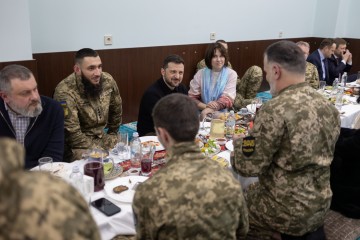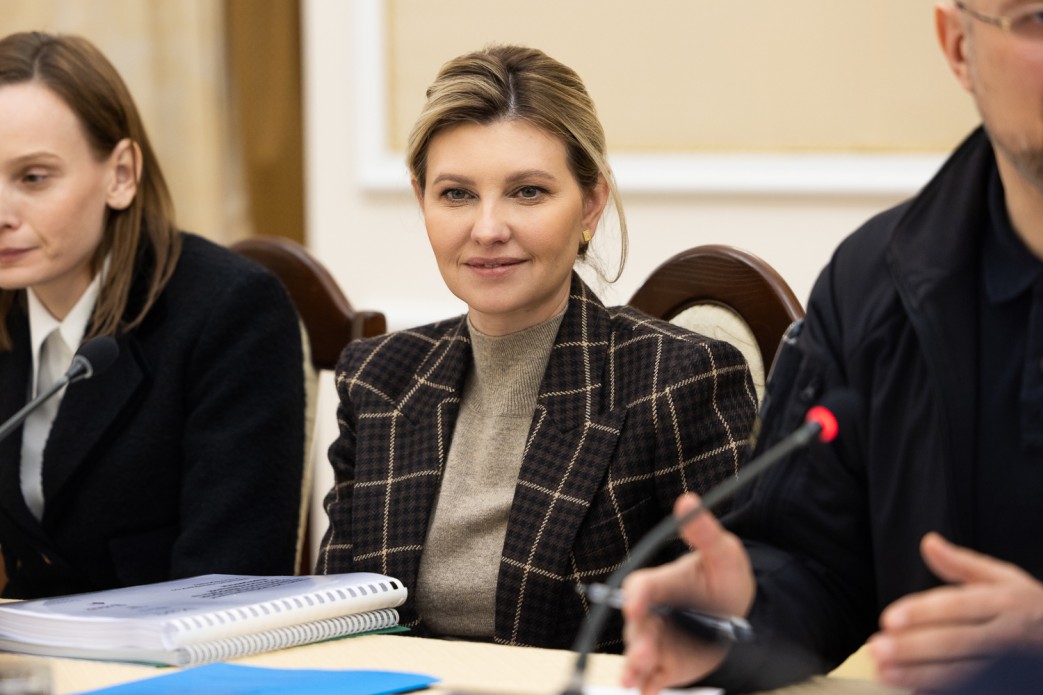As part of the development of the All-Ukrainian Mental Health Program, which is being created at the initiative of First Lady Olena Zelenska, a meeting of the Interagency Coordination Council on Mental Health Protection and Psychological Assistance to Persons Affected by Russian Aggression against Ukraine was held.

The event was attended by the wife of the President of Ukraine Olena Zelenska, Prime Minister Denys Shmyhal, representatives of central executive authorities, international organizations implementing systemic projects in the field of mental health and psychosocial support.
The meeting was focused on presenting the results of the audit of mental health services resources - the analysis of the capacities each ministry has, how they are used, and what gaps exist. A vision of the new system of care and a communication strategy for the All-Ukrainian Mental Health Program were also presented.
"Psychological care should be as accessible and ubiquitous as medical care. This is an ambitious goal. And the big challenge is to turn the appalling experience into post-traumatic growth. There is no such program anywhere in the world. But no one in the world in this century has experienced what we are experiencing," the First Lady said at the beginning of the event.

Prime Minister Denys Shmyhal spoke about the World Health Organization's (WHO) forecast that by 2025, one in two Ukrainians may face mental health problems. He stated that Ukrainian citizens are not accustomed to taking care of their mental health, which is also evidenced by sociological research. The audit found that people (especially children) are slipping through the system: less than 10% of the predicted prevalence of mental health disorders (e.g., depression, anxiety, eating disorders, etc.) is currently diagnosed.
The results of the audit were presented, including the following:
-
Only 50% of communities provide 5 out of 17 basic social services; the demand for services among internally displaced persons alone is 1.7 times higher than the amount of services provided in 2022.
-
The projected need for mental health care in primary care is 27 million cases, and only 1.2% of primary care professionals have received additional training in mental health as of the end of 2022, with this number potentially increasing to 10% in 2023.
-
The mental health curriculum in Ukraine covers less than 50% of the topics of similar curricula in developed countries.
-
One in two veterans and their family members will need psychological assistance, with a potential need for services amounting to about 2 million. In 2022, the Ministry of Veterans provided about 6,000 services, and in 2023, the budget is set for 40,000 services.

"Mental health is one of the markers of our resilience, our ability to resist and win. We need to think about the future now. The psychological recovery of Ukraine is as important as rebuilding infrastructure, housing or the energy sector. One of the key tasks is to create a system of psychological assistance and support adequate to the challenges. A system that would perform five basic functions: preventing and identifying problems, providing a wide range of assistance outside the hospital, ensuring psychosocial rehabilitation, providing specialized psychiatric care in the hospital, and constantly supporting people with mental disorders," Denys Shmyhal emphasized.
According to the presented vision of the new system, a psychosocial service component should be present at almost every point of contact of any person throughout his or her life.
"Nowadays, the price of a word - even a casual conversation - is very high. I think each of us has experienced this many times. A conversation at a checkout counter or in a bank can either deepen an existing trauma or support a person. That's why everyone who communicates with people, no matter what they do, should have the skills to take care of their mental health and be able to explain to others how to do it," the First Lady said.
The communication strategy of the mental health program was also presented at the meeting.
"We need to explain to our fellow citizens why they should see mental health professionals, why they shouldn’t be afraid or ashamed of psychological help, what self-help techniques exist, and how to take care of your condition yourself. We need to lay out a route for them on how and where to seek support. In fact, this means creating a new culture of attitude towards mental health in Ukraine. For decades, it has been believed that mental health problems do not exist if you do not talk about them. But in reality, not talking means being afraid. And being afraid is not about Ukrainians," Olena Zelenska added.

The audit of mental health services resources and the development of a communication strategy were made possible due to the support of the American people through the United States Agency for International Development (USAID).
It bears reminding that during the previous meeting of the Interagency Coordination Council, the results of the audit of citizens' needs for mental health and psychosocial support services, international experience in building mental health systems, and the operational roadmap "Priority multi-sectoral measures for mental health and psychosocial support in Ukraine during and after the war" developed by representatives of the public sector, UN agencies, international and Ukrainian organizations in coordination with WHO to respond to the challenges here and now were presented.
The development and implementation of the All-Ukrainian Mental Health Program is coordinated by the Ministry of Health of Ukraine in close cooperation with Ukrainian and international experts. The initiative is supported by the World Health Organization.




